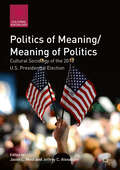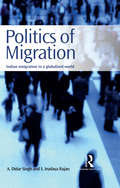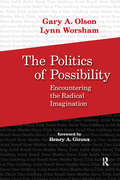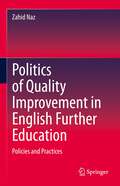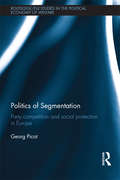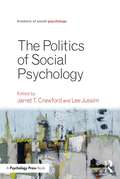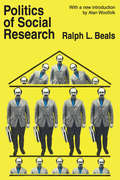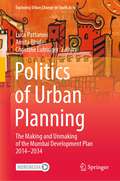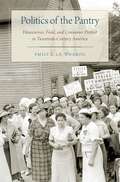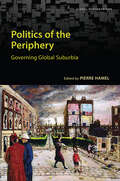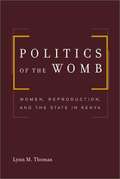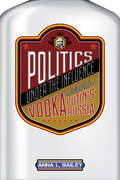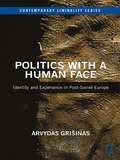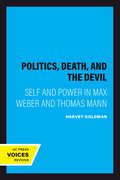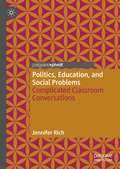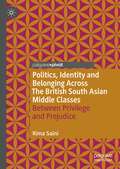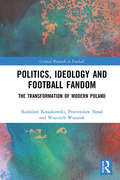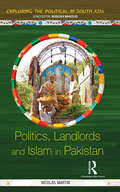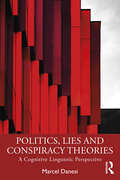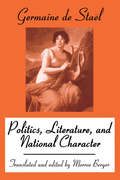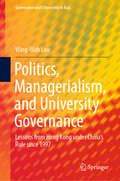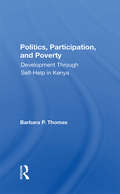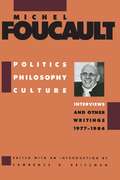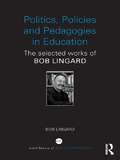- Table View
- List View
Politics of Meaning/Meaning of Politics: Cultural Sociology of the 2016 U.S. Presidential Election (Cultural Sociology)
by Jeffrey C. Alexander Jason L. MastThe 2016 U.S. presidential election revealed a nation deeply divided and in flux. This volume provides urgently needed insights into American politics and culture during this period of uncertainty. The contributions answer the election’s key mysteries, such as how contemporary Christian evangelicals identified in the unrepentant candidate Trump a hero to their cause, and how working class and economically struggling Americans saw in the rich and ostentatious candidate a champion of their plight. The chapters explain how irrationality is creeping into political participation, and demonstrate how media developments enabled a phenomenon like “fake news” to influence the election. At this polarized and contentious moment, this volume satisfies the urgent need for works that carefully analyze the forces and tensions tearing at the American social fabric. Simultaneously intellectual and accessible, this volume is designed to illuminate the 2016 U.S. presidential election and its aftermath for academics and students of politics alike.
Politics of Migration: Indian Emigration in a Globalized World
by S. Irudaya Rajan A. Didar SinghThis book studies the politics surrounding Indian emigration from the 19th century to the present day. Bringing together data and case studies from across five continents, it moves beyond economic and social movers of migration, and explores the role of politics—both local and global—in shaping diaspora at a deeper level. The work will be invaluable to scholars and students of migration and diaspora studies, development studies, international politics, and sociology as well as policy-makers, and non-governmental organizations in the field.
Politics of Possibility: Encountering the Radical Imagination
by Henry A. Giroux Gary A. Olson Lynn WorshamIn the probing interviews in this vibrant new book, eminent scholars struggle with some of the most crucial issues facing contemporary intellectuals. Poststructuralist philosopher Judith Butler discusses the pain of rigorous intellectual work, saying that it is necessarily extremely hard labor, as she examines the intersection of discourse and political action. Award-winning filmmaker, philosopher, and social theorist David Theo Goldberg reviews his life s work, especially on issues of racism. Literary critic and feminist philosopher Avital Ronell sets out to disrupt the standard logic of signification, to force readers into fresh ways of perceiving a subject at hand. Postcolonial theorist Homi Bhabha discusses how critical literacy is intimately connected to the question of democratic representation, and he elaborates on how cultural difference can lead to a politics of discrimination. And neo-Marxist cultural critic Slavoj i ek takes readers on an exhilarating journey through a wide range of critical subjects."
Politics of Quality Improvement in English Further Education: Policies and Practices
by Zahid NazThis book offers a rich account of how quality improvement agendas, informed by neoliberalism, create contradictory and complex contexts in which teachers produce different types of practices for specific purposes. Drawing on Michel Foucault’s analytical tools, archaeology and genealogy, this book weaves together findings from classroom observations, field notes and interviews to explore the dichotomies between practices focussing on day-to-day pedagogies and practices concerned with performance management and accountability initiatives. By attending to a Foucauldian conception of power and counter conduct, it explores new means of defining quality in teaching spaces. After considering existing quality assurance judgements, the book illuminates the significance of moving slightly away from an institutionalised enterprise culture and loosing relations with reductionist approaches as a starting point. While doing so, it reworks the idea of quality by presenting other ways of looking at the complex character of pedagogical real(s) with new insights into an emergentist and process-oriented conception of teaching practices. The book argues that we need to unlearn our existing knowledge of quality that overlooks contextual constraints and opportunities enmeshed in teaching practices. It questions the assumptions that the existing methods of observation are capable of quantifying the quality of education in a classroom or in a college in toto. By introducing the idea of documentisation, the book breaks new theoretical ground to show that this so-called system of robust accountabilities is not as self-evident as we believe and why we must rethink quality by unthinking our current common sense. Written for researchers in educational studies, practising teachers and policy makers, this book combines profound insights from theory and contemporary teaching practices with clear guidelines as to how educational policy making should be approached.
Politics of Segmentation: Party Competition and Social Protection in Europe (Routledge Studies in the Political Economy of the Welfare State)
by Georg PicotWhen political parties make policy decisions they are influenced by the competition they face from other parties. This book examines how party competition and party systems affect reforms of social protection. Featuring a historical comparison of Italy and Germany post-1945, the book shows how a high number of parties and ideological polarisation lead to fragmented and unequal social benefits. Utilising a comparative approach, the author brings together two important issues in welfare state research that have been insufficiently investigated. Firstly, the complex influence of party competition on social policy-making, and second, how some social groups enjoy better social protection than others. Moving beyond the two countries of the case study, the book proposes an innovative framework for studying segmentation of social protection and applies this framework to a wider set of 15 advanced welfare states. Overall, this book draws together different strands of research on political parties and on welfare states, and introduces a new argument on how party politics shapes social policy. An invaluable text on the political economy of the welfare state, Politics of Segmentation will be of interest to scholars of political economy, social policy and comparative politics.
Politics of Social Psychology (Frontiers of Social Psychology)
by Lee Jussim Jarret T. CrawfordSocial scientists have long known that political beliefs bias the way they think about, understand, and interpret the world around them. In this volume, scholars from social psychology and related fields explore the ways in which social scientists themselves have allowed their own political biases to influence their research. These biases may influence the development of research hypotheses, the design of studies and methods and materials chosen to test hypotheses, decisions to publish or not publish results based on their consistency with one’s prior political beliefs, and how results are described and dissemination to the popular press. The fact that these processes occur within academic disciplines, such as social psychology, that strongly skew to the political left compounds the problem. Contributors to this volume not only identify and document the ways that social psychologists’ political beliefs can and have influenced research, but also offer solutions towards a more depoliticized social psychology that can become a model for discourse across the social sciences.
Politics of Social Research
by Ralph L. Beals Alan WoolfolkPolitics of Social Research addresses itself to the question of the behavior appropriate for social scientists conducting research sponsored by or otherwise involving government agencies-our own and those of other countries. The simple patriotism that suggests that social scientists, like other citizens, should not hesitate to put their skills at the service of their government is questioned here and by practitioners. This is partly because of outright disagreement with government policies and partly because of the threat to independence posed by massive government funding. As this book plainly shows, the problems are especially acute for social scientists working abroad, where they are viewed as de facto representatives of American policy while at the same time they must accommodate to the policies of foreign governments.
Politics of Urban Planning: The Making and Unmaking of the Mumbai Development Plan 2014–2034 (Exploring Urban Change in South Asia)
by Luca Pattaroni Amita Bhide Christine LutringerThis book offers an interdisciplinary and dynamic account of the politicization of urban planning in Mumbai, India. It presents a unique perspective on the tensions and conflicts pervading the development and regulation of contemporary cities in the wider context of global urbanization, and broadens readers’ understanding of urban planning, chiefly focusing on the interplay between grassroots movements, experts’ involvement, and sociotechnical questions. As the respective chapters of the book show, the various controversies surrounding the Mumbai Development Plan (MDP) have called into question the social and political effects of reshaping the city, the exclusion, and inequalities it has produced, but also the role it confers on the state and the market, and its impacts on the environment. After carefully describing these controversies, the book tackles the fundamental democratic question of who gets to define the future of a city. Given its scope, the book is of interest to researchers, students, and teachers of city planning, urban development, and urban studies, as well as policymakers.
Politics of a Guaranteed Income: The Nixon Administration and the Family Assistance Plan
by Daniel P. MoynihanA prominent Democrat discusses The Nixon Administration and the Family Assistance Plan.
Politics of the Pantry: Housewives, Food, and Consumer Protest in Twentieth-century America
by Emily E. LB. TwarogThe history of women's political involvement has focused heavily on electoral politics, but throughout the twentieth century women engaged in grassroots activism when they found it increasingly challenging to feed their families and balance their household ledgers. Politics of the Pantryexamines how working- and middle-class American housewives used their identity as housewives to protest the high cost of food. In doing so, housewives' relationships with the state evolved over the course of the century. Shifting the focus away from the workplace as a site of protest, Emily E. LB. Twarog looks to the homefront as a starting point for protest in the public sphere. With a focus on food consumption rather than production, Twarog looks closely at the ways food - specifically meat - was used by women as a political tool. Engaging in domestic politics, housewives both challenged and embraced the social and economic order as they sought to craft a unique politicalvoice and build a consumer movement focused on the home. The book examines key moments when women used consumer actions to embrace their socially ascribed roles as housewives to demand economic stability for their families and communities. These include the Depression-era meat boycott of 1935, the consumer coalitions of the New Deal, and the wave ofconsumer protests between 1966 and 1973. Twarog introduces numerous labor and consumer activists and their organizations in both urban and suburban areas - Detroit, greater Chicago, Long Island, and Los Angeles.
Politics of the Periphery: Governing Global Suburbia (Global Suburbanisms)
by Pierre HamelNew urban forms characterizing contemporary metropolises reflect a certain continuity with the patterns of the past. They also include unexpected forms of settlement and design that have emerged in response to social and economic needs and as a way of leveraging new technologies. Politics of the Periphery sets out to explore sub/urban governance in diverse contexts in order to better understand how materiality and space are shaped by the possibilities and constraints of confronting actors. This collection, edited by Pierre Hamel, examines the empirical aspects of collective action and planning in eight urban regions around the world – across North America, Europe, Asia, and Africa – and reveals the impacts and consequences of various structures of suburban governance. The case studies feature a diverse range of local actors facing both the specificity of their respective milieus and the broader context of extended urbanization as metropolitan regions cope with new territorial challenges. The book focuses on suburbanization processes that characterize most of these post-metropolitan regions and questions whether it is possible to improve suburban governance in the face of growing uncertainties arising from structural and subjective transformations. Paying close attention to the relationship between the local and the global, Politics of the Periphery challenges the planning processes of evolving metropolitan regions.
Politics of the Womb: Women, Reproduction, and the State in Kenya
by Lynn M. ThomasIn more than a metaphorical sense, the womb has proven to be an important site of political struggle in and about Africa. By examining the political significance--and complex ramifications--of reproductive controversies in twentieth-century Kenya, this book explores why and how control of female initiation, abortion, childbirth, and premarital pregnancy have been crucial to the exercise of colonial and postcolonial power. This innovative book enriches the study of gender, reproduction, sexuality, and African history by revealing how reproductive controversies challenged long-standing social hierarchies and contributed to the construction of new ones that continue to influence the fraught politics of abortion, birth control, female genital cutting, and HIV/AIDS in Africa.
Politics under the Influence: Vodka and Public Policy in Putin's Russia
by Anna L. Bailey"You know just how serious a problem alcoholism has become for our country. Frankly speaking, it has taken on the proportions of a national disaster." So spoke Russian President Dmitry Medvedev in 2009 as the government launched its latest anti-alcohol campaign. Challenging the standard narrative of top-down implementation of policy, Anna Bailey’s Politics under the Influence breaks new ground in the analysis of Russian alcoholism and the politics of the Putin regime.The state is supposed to make policy in the national interest, to preserve the nation’s health against the ravages inflicted by widespread alcohol abuse. In fact, Bailey shows, the Russian state is deeply divided, and policy is commonly a result of the competitive interactions of stakeholders with vested interests. Politics under the Influence turns a spotlight on the powerful vodka industry whose ties to Putin’s political elite have grown in influence since 2009. She details how that lobby has used the anti-alcohol campaign as a way to reduce the competitiveness of its main rival—the multinational beer industry. Drawing on a wide range of sources including fieldwork interviews, government documents, media articles, and opinion polls, Bailey reveals the many ambivalences, informal practices, and paradoxes in contemporary Russian politics. Politics under the Influence exhibits the kleptocratic nature of the Putin regime; as a result, analysis of vested interests and informal sources of power is essential to understanding public policy in contemporary Russia. This book will be an invaluable resource for anyone working on policy and corruption in Putin’s Russia.
Politics with a Human Face: Identity and Experience in Post-Soviet Europe (Contemporary Liminality)
by Arvydas GrišinasPolitics with a Human Face presents a holistic understanding of identity formation in post-Soviet Europe, arguing that since politics is fundamentally a human affair. In order to adequately understand it, one needs to understand its human side first. Drawing on the thought of Dilthey, Ricoeur and Plato, the author employs empathy as a method, together with visual and historical analysis, to analyse the role of human experience in post-Soviet politics. As a result, the book offers a theoretical approach for assessing influence of the non-rationalistic factors, such as associative symbolism, human experience, political images and historical narratives, in both domestic and foreign affairs. A study at the juncture of Social Sciences and Humanities, Politics with a Human Face explores a number of cases, including Estonia, Lithuania, Poland and Russia, as well as the ongoing conflict in Ukraine, examining issues of liminal transition, ‘far-right’ movements, victimhood, ethnic conflict and political paradoxes. Seeking to shed light on the region’s agency and perception of both its own political and existential situation, and that of the surrounding world, this book constitutes a timely and original contribution to understanding the post-Soviet Europe.
Politics, Death, and the Devil: Self and Power in Max Weber and Thomas Mann
by Harvey GoldmanThis sequel to Harvey Goldman's well-received Max Weber and Thomas Mann continues his rich exploration of the political and cultural critiques embodied in the more mature writings of these two authors. Combining social and political thought, intellectual history, and literary interpretation, Goldman examines in particular Weber's "Science as a Vocation" and "Politics as a Vocation" and Mann's The Magic Mountain and Doctor Faustus.Goldman deals with the ways in which Weber and Mann sought an antidote to personal and cultural weakness through "practices" for generating strength, mastery, and power, drawing primarily on ascetic traditions at a time when the vitality of other German traditions was disappearing. Power and mastery concerned both Weber and Mann, especially as they tried to resolve problems of politics and culture in Germany. Although their resolutions of the problems they confronted seem inadequate, they show the significance of linking social and political thought to conceptions of self and active worldly practices.Trenchant and illuminating, Goldman's book is essential reading for anyone interested in political theory, social thought, and the intellectual history of Germany.
Politics, Education, and Social Problems: Complicated Classroom Conversations
by Jennifer RichThis book offers an innovative perspective on the intersection of politics, education, and social problems. It considers how we can create social change by talking about politics and social problems in more open, direct, and inclusive ways in educational spaces. Drawing on data from a range of settings, this book closely examines how and when complicated conversations take place in classrooms, schools, and communities. The book tackles a series of hot-button, timely issues, including race, religion, politics, and gender, and turns a critical eye to schools and the communities in which they are situated; the conversations adults have—and pointedly ignore—with one another; and, perhaps most critically, the politics that shape our society.
Politics, Identity and Belonging Across The British South Asian Middle Classes: Between Privilege and Prejudice (Palgrave Politics of Identity and Citizenship Series)
by Rima SainiThis book will discuss the growing socio-economic and political diversity of the groups that comprise the British South Asian diaspora, with a focus on the formation of the British South Asian "middle classes". They will be framed within this work as a heterogenous sub-population, but this book is be the first comprehensive effort to define them sociologically as a distinct ethnoracial collective with a unique political profile. It does this with reference to secondary statistical data and primary interview data, and engages with relevant academic and non-academic literature. It describes the ways in which socially mobile South Asian migrants and particularly their descendants in the UK relate to their racial, ethnic, religious, classed and gendered identities, their relationship with ‘Britishness’, and their politics. It will therefore be of interest to students and researchers of political sociology, particularly those specialising in race, processes of racism and racialisation, ethnic and ethno-religious identity, class and social mobility amongst ethnic minority groups, and the interaction between minority identity and political identity.
Politics, Ideology and Football Fandom: The Transformation of Modern Poland (Critical Research in Football)
by Radosław Kossakowski Przemysław Nosal Wojciech WoźniakFootball fans and football culture represent a unique prism through which to view contemporary society and politics. Based on in-depth empirical research into football in Poland, this book examines how fans develop political identities and how those identities can influence the wider political culture. It surveys the turbulent history of Poland in recent decades and explores the dominant right-wing ideology on the terraces, characterised by nationalism, ‘traditional’ values and anti-immigrant sentiment. As one of the first book-length studies of fandom in Eastern Europe, this book makes an important contribution to our understanding of society and politics in post-Communist states. Politics, Ideology and Football Fandom is an important read for students and researchers studying sport, politics and identity, as well as those working in sports studies and political studies covering sociology of sport, globalisation studies, East European politics, ethnic studies, social movements studies, political history and nationalism studies.
Politics, Landlords and Islam in Pakistan (Exploring the Political in South Asia)
by Nicolas MartinThis book offers unique insights into the changing nature of power and hierarchy in rural Pakistan from colonial times to present day. It shows how electoral politics and the erosion of traditional patron–client ties have not empowered the lower classes. The monograph highlights the persistence of debt-bondage, and illustrates how electoral politics provides assertive landlord politicians with opportunities to further consolidate their power and wealth at the expense of subordinate classes. It also critically examines the relationship between local forms of Islam and landed power. The volume will be of interest to scholars and researchers on Pakistan and South Asian politics, sociology and social anthropology, Islam, as also economics, development studies, and security studies.
Politics, Lies and Conspiracy Theories: A Cognitive Linguistic Perspective
by Marcel DanesiPolitics, Lies and Conspiracy Theories: A Cognitive Linguistic Perspective shows how language influences mechanisms of cognition, perception, and belief, and by extension its power to manipulate thoughts and beliefs. This exciting and original work is the first to apply cognitive linguistics to the analysis of political lies and conspiracy theories, both of which have flourished in the internet age and which many argue are threatening democracy. It unravels the verbal mechanisms that make these "different truths" so effective and proliferative, dissecting the verbal structures (metaphor, irony, connotative implications, etc.) of a variety of real-life cases concerning politicians, conspiracy theorists, and influencers. Marcel Danesi goes on to demonstrate how these linguistic structures "switch on" or "switch off" alternative mind worlds. This book is essential reading for students of cognitive linguistics and will enrich the studies of any student or researcher in language and linguistics more broadly, as well as discourse analysis, rhetoric, or political science.
Politics, Literature and National Character
by Madame De Stael Morroe BergerMadame Germaine de Stael is often regarded as the "mistress to an age", or (like England and Russia) one of the three great European "powers" of the 19th century. She was in some sense both, but she was also an important and influential writer whose works, astonishingly, have not, until this volume, been translated into English since the early 19th century. She absorbed the leading ideas of the Enlightenment on literature, politics, science and the social order; turned many of them to her own uses and then bequeathed them to the 19th century, which adopted much of the Enlightenment through her works. She had two related aims: by her writings on politics, to guide Europe as it entered the republican era and to help it maintain its cultural legacy and liberty; and to explain all literature by its relation to social institutions (which has had a profound effect on all subsequent studies of comparative literature). Here, in clear and flowing English prose that conveys both the personality and the style of the original - and that corrects the errors of earlier translations - are selections from Madame Germaine de Stael's major works, including "Considerations on the Principal Events of the French Revolution", "Literature Considered in its Relation to Social Institutions", "Essay on Fiction", "On Germany" and her reflections on Russian and English as well as German national character. They make plain both her amazing modern approach to such subjects as politics, literature, science, education and women, and the tremendous repercussions her work has had.
Politics, Managerialism, and University Governance: Lessons from Hong Kong under China’s Rule since 1997 (Governance and Citizenship in Asia)
by Wing-Wah LawThis book explores the interplay between politics, managerialism, and higher education, and the complex linkages between politics and public universities in Hong Kong. Since the mid-20th century, literature on the state, market, and higher education has focused on the state’s shifting role from the direct administration to the supervision of higher education, and its increased use of market and managerial principles and techniques to regulate public universities. However, very few studies have addressed the political influences on university governance produced by changing state-university-market relationships, the chancellorship of public universities, or students’ and academics’ civic engagement with regard to sensitive political issues. The book examines both the positive and problematic outcomes of using market principles and managerialism to reform public higher education; questions the longstanding tradition of university chancellorship; explores the issue of external members holding the majority on university governing boards; probes into the dilemma of either relying on the system or a good chancellor and external members to preserve universities’ autonomy and academic freedom; and assesses the cost of students’ and academics’ civic engagement with regard to politically sensitive issues.
Politics, Participation, And Poverty: Development Through Self-help In Kenya
by Barbara Thomas-Slayter Barbara P. ThomasFocusing on the distribution of benefits in relation to class, ethnicity, and gender, this book explores the methods to which the rural poor can organize themselves to participate in economic and social development and examines the roles that self-help organizations play in the political economy of Kenya. Dr. Thomas looks at the competition for pow
Politics, Philosophy, Culture: Interviews and Other Writings, 1977-1984
by Michel FoucaultPolitics, Philosophy, Culture contains a rich selection of interviews and other writings by the late Michel Foucault. Drawing upon his revolutionary concept of power as well as his critique of the institutions that organize social life, Foucault discusses literature, music, and the power of art while also examining concrete issues such as the Left in contemporary France, the social security system, the penal system, homosexuality, madness, and the Iranian Revolution.
Politics, Policies and Pedagogies in Education: The selected works of Bob Lingard
by Bob LingardIn the World Library of Educationalists, international experts compile career long collections of what they judge to be their finest pieces of work – extracts from books, key articles, salient research findings, major theoretical and practical contributions – so the world can read them in a single manageable volume. Readers will be able to follow the themes and strands and see how their work contributes to the development of the field. Bob Lingard has spent the last 30 years researching and writing in universities in Australia, England and Scotland about changing education policy issues. His work is written from a sociological perspective and with a commitment to social justice. He is the co-editor and co-author of 17 books and more than 100 journal articles and book chapters. In Politics, Policies and Pedagogies in Education, Bob Lingard provides critical sociological engagement with the politics of education. The focus is education policy and the impact of globalization, including epistemological and methodological issues necessary for researching education policy today. Topics analyzed include: educational restructuring new accountabilities and testing mediatization of education policy policy as numbers the global policy field and policy borrowing pedagogies. Lingard also considers the nature of educational research today. He has selected 12 of his key writings and in a critical introduction situates and contextualizes the work against key developments in the field and in the changing world.
